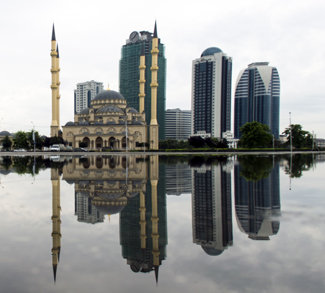Singapore has not suffered any terrorist attacks since the mid-1990s. Despite the absence of any attacks, Singapore is increasingly vulnerable to terrorism and is a potential target for international terrorism via neighboring countries, insider threats, and returning foreign fighters to the region. New laws and amendments introduced by Singapore’s Parliament to boost physical security went into effect at the end of March 2017, further underscoring the growing concern over terrorism.
The National Consortium for the Study of Terrorism and Responses to Terrorism (START) Global Terrorism Database (GTD) indicates that Singapore has experienced seven attacks over the past four decades. Despite the absence of successful terrorist attacks, the terrorist threat to Singapore appears to be on the rise. This assertion is based on several factors:
News Laws Underscore Rising Terrorism Threat
Senior Minister of State for Home Affairs Desmond Lee announced in Parliament in March 2017 that the Public Order Act would be amended to enhance measures to better guard against terrorism with regard to events with large crowds. A new Infrastructure protection act will also be introduced in 2017. These new measures went into effect at the end of March 2017, and will make businesses increasingly responsible to protect buildings and infrastructure against terrorism should they organize high-risk and large crowd events. Proposed measures include security officers, barricades, and full-person and bag checks. These laws are another indication that Singapore’s authorities view terrorism as a growing threat.
Singapore’s Insider Threat and Geographical Proximity to Terrorist-Prone Neighbors
Singapore has foiled a number of terrorist plots, including an August 2016 plot to attack the Marina Sands resort with rockets (unknown weapon) from the Indonesian island Batam. The island is located less than 30 km from Singapore. The attack itself was reportedly ordered by Bahrun Naim, the leader of Katibah Nusantara, a unit consisting of Southeast Asians fighting with the Islamic State in Syria and Iraq (ISIS).
Singaporean authorities made significant arrests in 2015 and 2016. These terrorism-related arrests highlight a transnational terrorist threat from within Singapore. In November 2015 and March 2016, the Internal Security Department (ISD) detained 40 Bangladeshi workers planning to target Bangladeshi military and government workers. The ringleader, Rahman Mizanur, said he would carry out an attack anywhere if he were instructed by ISIS to do so. The recruitment occurred inside Singapore and targeted foreign Bangladeshi workers in the construction and maritime industries.
These incidents are a reminder that terrorists associated with ISIS have both the intent, and a history of attempting to target Singapore. The radicalization of foreigner workers also suggests that Singapore is not completely immune to ISIS’ radical ideology.
Singapore is also located in close proximity to countries that experienced recent terrorist attacks by ISIS and the Abu Sayyaf Group (ASG). Malaysian authorities have for example prevented nine ISIS terrorist plots against Malaysia since 2014. ISIS’ first successful attack in Indonesia occurred in January 2016 and shut down a busy shopping district in downtown Jakarta. The leader of Katibah Nusantara had allegedly ordered the attack in Jakarta. ISIS related activities in 2016 and 2017 indicate that ISIS has turned its attention to Southeast Asia and terrorism could spill over into Singapore from neighboring countries.
The City-State Island – A “Legitimate” and Attractive Economic Target
Singapore is a contributor to the Operation Inherent Resolve coalition that fights ISIS in Syria and Iraq. ISIS online magazines have repeatedly called for retributive attacks against members of the anti-ISIS coalition. A number of countries, including but not limited to France, Russia, Belgium, and Germany have specifically been targeted by ISIS. Singapore is, in the eyes of ISIS, a legitimate target.
Al Qaeda in the Indian Subcontinent (AQIS) and ISIS have previously expressed intents and incited supporters to target Singapore in social media and online magazines. From a terrorist perspective, Singapore is an attractive target. Singapore is the region’s economic capital and hosts many Western multinational corporations. The city-state island is also a strategic trade port with economic trade ties between Southeast Asia, Europe, and the Middle East. It is primarily an economic target.
Furthermore, as AQIS once noted in its Resurgence magazine, Singapore is a strategic chokepoint and attacks against freighters with small-boats loaded with explosives in the Malacca Strait could temporarily disrupt global oil and commercial trade. Singapore’s tourism industry is also a major contributor to the country’s gross domestic products and a sustained terrorism campaign could undermine foreign investments and tourism revenues.
The Return of ISIS Fighters – Threatening Regional Stability and Singapore
The degradation of ISIS in Syria and Iraq or loss of territory and rank-and-file members could result in a returning wave of Southeast Asian fighters in the months ahead. Some foreign fighters may be disengaged or disillusioned with ISIS ideology, and others may still be motivated to attack on behalf of ISIS. A return of well-trained fighters, many of whom are members of Katibah Nusantara, could strengthen terrorist cells operating in the region, primarily in Malaysia and Indonesia, and undermine regional security.
ISIS also appears to be making progress in establishing a ‘province’ (Wilayat) in the southern Philippines (central Mindanao). ISIS has, with some effectiveness, tapped into local insurgencies and terrorist groups in the region. Rohan Gunaratna, head of the International Center for Political Violence and Terrorism Research in Singapore notes that ISIS leader Abu Bakr al-Baghdadi has appointed the former ASG chief, Isnilon Hapilon, to lead ISIS in Southeast Asia. If ISIS opens up a new front in Southeast Asia while strengthening its ties with terrorist groups in the region such as ASG and Jemaah Ansharut Tauhid, it could put not just Singapore, but Australia (which is geographically close to southern Philippines) in the crosshairs of ISIS-inspired terrorism as well.
The opinions, beliefs, and viewpoints expressed by the authors are theirs alone and don’t reflect any official position of Geopoliticalmonitor.com.




